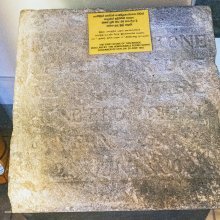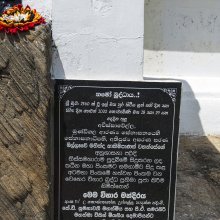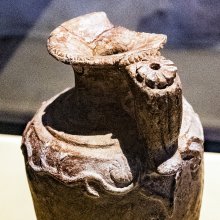Di, Ḍi: 17 definitions
Introduction:
Di means something in Hinduism, Sanskrit, Buddhism, Pali, the history of ancient India, Marathi, Jainism, Prakrit, Hindi, biology. If you want to know the exact meaning, history, etymology or English translation of this term then check out the descriptions on this page. Add your comment or reference to a book if you want to contribute to this summary article.
Images (photo gallery)
(+23 more images available)
In Hinduism
Vyakarana (Sanskrit grammar)
Source: Wikisource: A dictionary of Sanskrit grammarDi (दि).—A technical term in the Jainendra Vyakarana for the term प्रगृह्य (pragṛhya) used by Panini.
--- OR ---
Dī (दी).—A technical term in the Jainendra Vyakarana for दीर्ध (dīrdha) (long vowel) in Panini's grammar.

Vyakarana (व्याकरण, vyākaraṇa) refers to Sanskrit grammar and represents one of the six additional sciences (vedanga) to be studied along with the Vedas. Vyakarana concerns itself with the rules of Sanskrit grammar and linguistic analysis in order to establish the correct context of words and sentences.
India history and geography
Source: Cologne Digital Sanskrit Dictionaries: Indian Epigraphical GlossaryDi.—(IE 8-1; CII 3), abbreviation of dina, dine, divasa or divase; used in connection with śu or su and ba in the case of lunar months and by itself in the case of solar months. Note: di is defined in the “Indian epigraphical glossary” as it can be found on ancient inscriptions commonly written in Sanskrit, Prakrit or Dravidian languages.

The history of India traces the identification of countries, villages, towns and other regions of India, as well as mythology, zoology, royal dynasties, rulers, tribes, local festivities and traditions and regional languages. Ancient India enjoyed religious freedom and encourages the path of Dharma, a concept common to Buddhism, Hinduism, and Jainism.
Biology (plants and animals)
Source: Wisdom Library: Local Names of Plants and DrugsDi in the Mizo language is the name of a plant identified with Imperata cylindrica Imperata cylindrica (L.) P.Beauv. from the Poaceae (Grass) family. For the possible medicinal usage of di, you can check this page for potential sources and references, although be aware that any some or none of the side-effects may not be mentioned here, wether they be harmful or beneficial to health.
Source: Google Books: CRC World Dictionary (Regional names)1) Di in Ivory Coast is the name of a plant defined with Milicia excelsa in various botanical sources. This page contains potential references in Ayurveda, modern medicine, and other folk traditions or local practices It has the synonym Chlorophora tenuifolia Engl. (among others).
2) Di is also identified with Oryza sativa It has the synonym Oryza glutinosa Lour. (etc.).
3) Di in Nigeria is also identified with Triplochiton scleroxylon It has the synonym Samba scleroxylon (K. Schum.) Roberty.
4) Di in Sierra Leone is also identified with Zea mays It has the synonym Zea mays var. everta (Sturtev.) L.H. Bailey (etc.).
Example references for further research on medicinal uses or toxicity (see latin names for full list):
· J. Agric. Trop. (1956)
· Dictionary of the economic products of India (1891)
· Physis. Revista de la Sociedad Argentina de Ciencias Naturales (1933)
· Plant Systematics and Evolution (1993)
· Genera Plantarum (1880)
· Nomenclator Botanicus (1821)
If you are looking for specific details regarding Di, for example diet and recipes, chemical composition, extract dosage, pregnancy safety, health benefits, side effects, have a look at these references.

This sections includes definitions from the five kingdoms of living things: Animals, Plants, Fungi, Protists and Monera. It will include both the official binomial nomenclature (scientific names usually in Latin) as well as regional spellings and variants.
Languages of India and abroad
Pali-English dictionary
Source: Sutta: The Pali Text Society's Pali-English DictionaryDi°, secondary base of numeral “2, ” contracted fr. dvi: see under dvi B I.4. (Page 320)

Pali is the language of the Tipiṭaka, which is the sacred canon of Theravāda Buddhism and contains much of the Buddha’s speech. Closeley related to Sanskrit, both languages are used interchangeably between religions.
Marathi-English dictionary
Source: DDSA: The Molesworth Marathi and English Dictionarydī (दी).—m (Vulgar for divasa) A day.
Source: DDSA: The Aryabhusan school dictionary, Marathi-Englishḍī (डी).—or -
--- OR ---
ḍī (डी).—or -
--- OR ---
dī (दी).—or-
Marathi is an Indo-European language having over 70 million native speakers people in (predominantly) Maharashtra India. Marathi, like many other Indo-Aryan languages, evolved from early forms of Prakrit, which itself is a subset of Sanskrit, one of the most ancient languages of the world.
Sanskrit dictionary
Source: DDSA: The practical Sanskrit-English dictionaryḌi (डि).—(ḍemati) To hurt, injure.
Derivable forms: ḍim (डिम्).
--- OR ---
Ḍī (डी).—1, 4. Ā. (ḍayate, ḍīyate, ḍiḍye, aḍayiṣṭa, ḍayitum, ḍīna)
1) To fly, pass through the air.
2) To go, -With प्र (pra) to fly up; हंसैः प्रडीनैरिव (haṃsaiḥ praḍīnairiva) Mṛcchakaṭika 5.5.
-prod to fly up; प्रोड्डीयेव बलाकया सरभसं सोत्कण्ठमालिङ्गितः (proḍḍīyeva balākayā sarabhasaṃ sotkaṇṭhamāliṅgitaḥ) 23.
--- OR ---
Dī (दी).—I. 4 Ā. (dīyate, dīna)
1) To perish, die.
2) To waste, decay, diminish -II. 4. P. (dīyati) Ved. soar, fly. -III. 3 P. Ved.
1) To shine.
2) To please, be admired, appear good.
3) To bestow upon by shining; संददस्वान् रयिमस्मासु दीदिहि (saṃdadasvān rayimasmāsu dīdihi) Ṛgveda 2.2.6.
--- OR ---
Dī (दी).—f. Decay, ruin.
Derivable forms: dīḥ (दीः).
Source: Cologne Digital Sanskrit Dictionaries: Shabda-Sagara Sanskrit-English DictionaryḌī (डी).—[(ṅa) ḍīñ] r. 1st and 4th cls. (ḍayate ḍīyate) 1. To fly, to pass through the air. 2. To go, to move. With ava, prefixed, To fly down, to to alight. With ut, To fly up, to soar. With pari, To fly round. With pra, To fly well or swiftly. With sam, To fly well or in flocks. With sam and ut, To fly up by degrees. nabhogatau bhvā0 divā0 ātma0 saka0 seṭ .
--- OR ---
Dī (दी).—r. 4th cl. (o ṅa) odīṅa (dīyate) To waste, to diminish, to be reduced, to decay. divā0 ā0 aka0 aniṭ .
--- OR ---
Dī (दी).—f. (dīḥ) Wasting, destruction. E. dī to waste, kvip aff.
Source: Cologne Digital Sanskrit Dictionaries: Benfey Sanskrit-English DictionaryḌī (डी).— (akin to 1. dī, q. cf.), i. 1 and 4, [Ātmanepada.] To fly. Ptcple. of the pf. pass. ḍina, n. Flying, the flight of a bird, Mahābhārata 8, 1899.
— With the prep. ati ati, atiḍīna, n. Flying over, Mahābhārata 8, 1900.
— With abhi abhi, abhiḍīna, n. Flying towards, Mahābhārata 8, 1900.
— With ava ava, avaḍīna, n. Flying down, Mahābhārata 8, 1899.
— With ud ud, To fly up, [Pañcatantra] 106, 1. uḍḍīna, Flown up, Mahābhārata 7, 776. n. 1. Flying up, Mahābhārata 8, 1899. 2. The flight of a bird, [Pañcatantra] 114, 25.
— With prod pra-ud, To fly up and away, [Mṛcchakaṭikā, (ed. Stenzler.)] 84, 22. proḍḍīna, Flown up and away, [Rāmāyaṇa] 4, 63, 24.
— With ni ni, niḍīna, n. Flying down, Mahābhārata 8, 1899.
— With parā parā, parā- ḍīna, n. Flying away, Mahābhārata 8, 1900.
— With pari pari, pariḍīna, n. Flying round, Mahābhārata 8, 1900.
— With pra pra, praḍīna, Flown forth, [Rāmāyaṇa] 6, 83, 26; n. Flying forward, Mahābhārata 8, 1899.
— With vi vi, viḍīna, n. Flying apart, Mahābhārata 8, 1900.
— With sam sam, saṃḍīna, n. Flying together, Mahābhārata 8, 1899.
— With avasam ava-sam, avasaṃdīna, n. Flying down together, Mahābhārata 8, 1901.
--- OR ---
Dī (दी).— (cf. ḍī), i. 4, [Parasmaipada.] To soar, to fly (ved.).
— Cf. probably perhaps
--- OR ---
Dī (दी).—anomal. ii. 3, dīdī, [Parasmaipada.], [Ātmanepada.] To shine (ved.).
— Cf. probably also
--- OR ---
Dī (दी).—i. 4, [Ātmanepada.] To waste, to go to ruin. Ptcple. of the pf. pass. dīna, 1. Scanty (ved.). 2. Afflicted, wretched, [Mānavadharmaśāstra] 9, 238. Comp. A-dina, joyful. Paridīna, much afflicted. Sa -dīna + m, adv. lamentably.
Source: Cologne Digital Sanskrit Dictionaries: Cappeller Sanskrit-English DictionaryḌī (डी).—ḍayate ḍīyate [participle] ḍīna fly, move through the air.
--- OR ---
Dī (दी).—1. dīyati dīyate fly.
--- OR ---
Dī (दी).—2. v. dīdi.
Source: Cologne Digital Sanskrit Dictionaries: Monier-Williams Sanskrit-English Dictionary1) Ḍī (डी):—[class] 1. 4. [Ātmanepada] ḍayate, ḍīyate ([Naighaṇṭuka, commented on by Yāska ii, 14; Pāṇini 7-2, 10], [vArttika] 7, [Patañjali]; [perfect tense] ḍiḍye, [viii, 4, 54; Kāśikā-vṛtti]; [present participle], ḍayamāna, [59; Kāśikā-vṛtti]; [Aorist] aḍayiṣṭa, [Vopadeva])
—to fly, [Dhātupāṭha];—cf. uḍ-, proḍ-.
2) Dī (दी):—1. dī (cf. √ḍi) [class] 4. [Ātmanepada] [Parasmaipada] dīyati, te, to soar, fly, [Ṛg-veda; Sāma-veda] :—[Intensive] [infinitive mood] dedīyitavai, to fly away, [Śatapatha-brāhmaṇa]cf. ḍī; [Greek] δίεμαι, δίνη, δινεύω, δῖνος.
3) 2. dī (dīdī or dīdi). [class] 3. [Parasmaipada] 3. [plural] dīdyati ([imperative] dīdihi and didīhi, [Ṛg-veda]; [imperfect tense] adīdet, [ib.]; [perfect tense] dīdāya or ([Śatapatha-brāhmaṇa]) dīdaya; dīdetha, didiyus, [ib.]; [subjunctive] dīdayati, yat, [ib.]; dīdayat, [Ṛg-veda x, 30, 4; 95, 12]; dīdāyat, [Atharva-veda iii, 8, 3]; dīdayante, [ib. xviii, 3, 23]; Prec. dīdyāsam, [Taittirīya-brāhmaṇa]; p. Pres. [Parasmaipada] dīdiat [Ātmanepada] dīdiāna, p. [perfect tense] dīvas), [Ṛg-veda] to shine, be bright;
—to shine forth, excel, please, be admired, [Ṛg-veda; Atharva-veda; Brāhmaṇa] ;—bestow upon ([locative case] or [dative case]) by shining, [Ṛg-veda ii, 2, 6; i, 93, 10. [Cf.δέατο, δέελος, δῆλος.] ]
4) 3. dī [class] 4. [Ātmanepada] dīyate, to decay, perish ([Dhātupāṭha xxvi, 25]; didīye; dāsyate, dātā; adāsta, [Pāṇini 6-4, 63; i, 50]) :—[Causal] dāpayati, [Vopadeva] :—[Desiderative] didiṣate and didāsate, [ib.]
5) 4. dī f. decay, ruin.
Source: Cologne Digital Sanskrit Dictionaries: Yates Sanskrit-English Dictionary1) Ḍī (डी):—(ṅa) ḍayate 1. d. To fly, to go. (ya) ḍīyate 4. d. Idem. With ava to fly down; with ut to fly up; with pari to fly round; with pra to fly well; with samut to fly together; to fly up together.
2) Dī (दी):—(ya, ṅa, o) dīyate 4. d. To waste.
3) (dīḥ) 3. f. Wasting.
[Sanskrit to German]
Sanskrit, also spelled संस्कृतम् (saṃskṛtam), is an ancient language of India commonly seen as the grandmother of the Indo-European language family (even English!). Closely allied with Prakrit and Pali, Sanskrit is more exhaustive in both grammar and terms and has the most extensive collection of literature in the world, greatly surpassing its sister-languages Greek and Latin.
Hindi dictionary
Source: DDSA: A practical Hindi-English dictionaryDī (दी):—(v) gave—feminine singular past tense form of [denā]; (nf) abbreviated form of [dīdī]elder sister.
...
Prakrit-English dictionary
Source: DDSA: Paia-sadda-mahannavo; a comprehensive Prakrit Hindi dictionaryDi (दि) in the Prakrit language is related to the Sanskrit word: Dvi.
Prakrit is an ancient language closely associated with both Pali and Sanskrit. Jain literature is often composed in this language or sub-dialects, such as the Agamas and their commentaries which are written in Ardhamagadhi and Maharashtri Prakrit. The earliest extant texts can be dated to as early as the 4th century BCE although core portions might be older.
See also (Relevant definitions)
Starts with (+5058): Dakkina, Deshitodi, Di bao lan, Di bu rong, Di can, Di er cao, Di feng pi, Di fu, Di gan, Di gua, Di gui, Di hua xi xin, Di huang, Di jin, Di jin cao ya shu, Di ma huang, Di nie, Di qiang wei, Di tan cao, Di tang hua.
Ends with (+9980): A-campirannatacamati, A-karpaviputi, Aachaara jondi, Aadabukkudi, Aadi, Aakasmiktavaadi, Aanabahe-hindi, Aanathottavadi, Aane mundi, Aantedi, Aathi chedi, Aatru-chedi, Abadi, Abagedi, Abarugedi, Abbudi, Abdi, Abhayadi, Abhedavadi, Abhedin.
Full-text (+1647): Vedi, Anadi, Dim, Adi, Chedi, Dadi, Akridin, Vadi, Nadi, Sharadin, Dadin, Ajnasampadin, Vivadin, Vishadin, Avivadin, Pararthavadin, Satyavadin, Kutsavadin, Sarvavedin, Apavadin.
Relevant text
One of your search terms exceeds the minimun character amount per search term. This amount currently equals 2.
No search results for Di, Dī, Ḍī, Ḍi in any book or story.
Related products
(+1 more products available)











